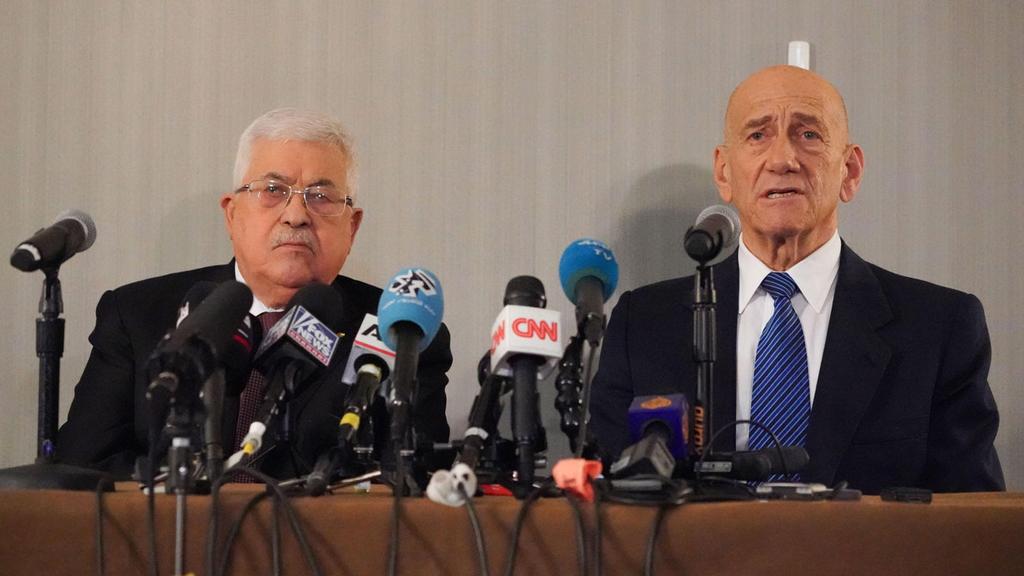The release of U.S peace plan has renewed the debate over the best solution for the Israeli-Palestinian conflict.
For many decades, people both good and bad have bought into the myth that the Palestinians want peace - if only Israel were a little more generous or the Americans came up with a serious agreement, peace would be just around the corner.
For those on the dark side, this belief stems from a desire to blame Israel for all the crimes of the world.
3 View gallery


Palestinian President Mahmoud Abbas and former PM Ehud Olmert slam the new U.S. peace plan at a press conference in New York, Feb. 11, 2020
(Photo: AFP)
For the good, it stems from a sincere and genuine desire for peace, but one blighted by (sometimes willful) ignorance or self-deception on the part of those who find it difficult to understand the difference between wishes and facts.
Let us set aside for a moment the historical Palestinian refusal of the Peel Commission in 1937, the United Nations Partition Proposal in 1947 and in the form of the three "nos" at Khartoum in the immediate aftermath of the 1967 Six-Day War.
Let us focus on the more pertinent era, where each of the major peace initiatives – by Bill Clinton in 2000, Ehud Olmert in 2008 and John Kerry and Barack Obama in 2014 – have all met the same rejectionist response from the Palestinians.
Self-deception
One could continue with more examples. There are other official public announcements and there are more proposals that were revealed by the Palestinians.
For example, there is a document that calls for the annual return of 15,000 Palestinian refugees, over a period of 10 years. And while it sporadically resurfaces, it has only ever been presented - in December 2009, when the negotiations with Olmert were already a thing of the past.
During those negotiations, as revealed in one of the Palestinian documents, a demand was formulated for the return of 1,016,511 refugees to Israel.
In any case, both Mahmoud Abbas and Saeb Erekat not only rejected Olmert's offer, but demanded instead a mass return.
3 View gallery


Bill Clinton, Yasser Arafat and Ehud Barak at the Camp David peace talks in July 2000
(Photo: Reuters)
In 2019, the Palestinians themselves published a booklet in Hebrew by the "PLO Committee for Interaction with Israeli Society." The booklet, entitled "Palestinian positions on the basic issues of conflict with Israel," was meant to appeal to Israeli voters ahead of the April 2019 elections.
In the booklet, there is no trace of giving up on the right of return. But there is reference to the Arab Peace Initiative presented by Saudi Arabia in 2002, which does not include the right of return. It was a welcome turning point.
Sadly, following pressure from the rejectionist states, the Palestinians and then-Lebanese president Emile Lahoud, the right of return was incorporated into the initiative.
Some years ago, I was invited to a meeting of Israelis with Palestinian official Nabil Shaath. It was wonderful, up until the moment when I reminded Shaath of his own comment on July 3, 2011: "We will never accept a formula of 'two states for two peoples' to resolve the conflict."
I asked him if he had rejected that position; he evaded the question and I was no longer invited to these meetings.
Why should anyone be allowed to upset the applecart of delusion?
As long as the left in Israel and the rest of the world insists on ignoring the facts, it is not promoting peace, it is promulgating Palestinian refusal.
This is bad for the Palestinians and it is bad for Israel.
Previous Palestinian compromise
Nonetheless, there were some points in the late 1980s and in the 1990s, at which there were signs that some Palestinian leaders were willing to compromise.
Following pressure from then-U.S. Secretary of State George Schultz, Yasser Arafat himself stated: "The Palestinian National Council has agreed to recognize two states, a Palestinian state and a Jewish state."
In the informal Beilin-Abu Mazen plan of 1995, it was agreed that the Palestinian capital would be in Abu Dis, and that there would be no implementation of the right of return within Israel.
The 2002 Declaration of Principles formulated by Ami Ayalon and Sari Nusseibeh included recognition that "Israel is the only state of the Jewish people."
The Geneva Initiative also included a waiver of the right of return, yet immediately after it was signed, the Palestinians who participated in the effort made clear that they did not really intend to give up this point.
A move toward giving up the right of return could have paved the way for an agreement on the basis of two states for two nations.
But the Palestinian position has become more and more radical over the years. The Fatah conference of 2009, headed by Abbas, decided unequivocally to reject the concept of a Jewish state.
It is worth noting the precise wording of that decision: "Absolute opposition, which will not be reversed, to recognition of Israel as a 'Jewish state'."
Palestinian refusal was joined by a host of NGOs that usually boasted of their concern for "human rights."
They ran a campaign that essentially denied Israel's right to exist as a Jewish state and took an uncompromising position on the issue of return.
This was a devastating campaign, and was actually anti-Palestinian as the Israeli left, which swayed the global left, could have played a major role.
Certainly, a clear statement might have helped the Palestinians climb down from the tree of the right of return.
But instead the opposite happened. Instead of encouraging the buds of compromise, leftist organizations joined a campaign that blamed Israel for the lack of peace.
Israeli responsibility
Nothing exempts Israel from responsibility for its settlement policies, sometimes in violation of its own commitments such as its pledge in then-U.S. president George W. Bush's roadmap to peace to dismantle outposts set up after March 2001.
But that is not the cause of Palestinian rejectionism and Israel must certainly fulfill every commitment it has undertaken and also strive for peace.
Yet the quest for peace does not demand blindness or self-deception. When the peace camp creates the illusion that an agreement is close at hand, it serves to perpetuate the conflict.
Ehud Barak, Bill Clinton, Ehud Olmert and Barack Obama have all made their own peace proposals and the Palestinians have refused them all.
3 View gallery


U.S. President Barack Obama and Secretary of State meeting with President Shimon Peres in Jerusalem, March 2013
(Photo: AFP)
So instead of an agreement that will apparently not be reached in the foreseeable future, an arrangement must be sought that includes both Israeli security control and separation from the Palestinians.
Such an arrangement should grant Palestinians autonomy in most areas of their lives, including housing construction, on 70% of the land in Judea and Samaria, perhaps even based on the Trump plan.
When there is a strategic change in the geopolitics of the region, such as the weakening of political Islam or within Hamas itself, or regime change in Iran, I hope it will be possible to move from arrangement to an agreement.
Inshallah.

